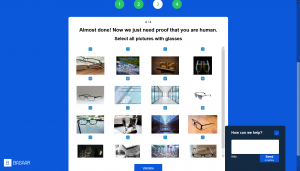
Initially, I didn’t know if I’ve reached the end of the “game”, but I stopped here (see image above) as I’ve spent too much time trying to figure out how to get to the next step. After the meeting on Collaboration Ultra, I realized that I am not at the end until I see the Carlton dance. So, I went back and I was able to get to the end in under 4 minutes!

What is interesting is that my partner is currently learning about design and programming, so to him, this task was quite difficult. He took a much longer time to complete as he didn’t know that this website was purposely flawed, and I purposely left out this information. So, from his experience and his understanding of website layout, he was completely baffled about why anyone would design a website like this until I told him that this was done on purpose.
I think it is also important to note how this site had worked diligently to distract, confuse, and get our attention. For example, the flashing light that goes from 1-4 repeatedly, the clock pop-up, the large red banner on the top of the screen, etc. Similar to what Harris noted, “The goal is the race for our attention” (2017), and this site did a great job at getting our attention, but in the utmost annoying way possible.
As I watch Tufekci explain the exponential growth of the algorithm for targeting advertisement, which is quite frightening and interesting at the same time, I wonder what better way can we utilize this technology. One of her examples was how the computer is able to figure out who is most likely dealing with or have underlying bipolar conditions and are the best target for selling Vegas ticket is unreal (Tufekci, 2017). With technology like this being used for advertisement is wasteful because think of what we can do with this to help detect other mental illness that people might not know like depression, having suicidal thoughts, schizophrenia, etc. On the other hand, I also understand the privacy concern over having computers analyzing and categorizing people under certain categories, such as having a mental illness, without professional psychiatric assessment.
Reference
Harris, T. (2017). How a handful of tech companies control billions of minds every day. Retrieved from https://www.ted.com/talks/tristan_harris_the_manipulative_tricks_tech_companies_use_to_capture_your_attention?language=en
Tufekci, Z. (2017). We’re building a dystopia just to make people click on ads. Retrieved from https://www.ted.com/talks/zeynep_tufekci_we_re_building_a_dystopia_just_to_make_people_click_on_ads?language=en